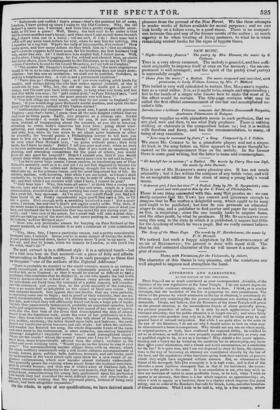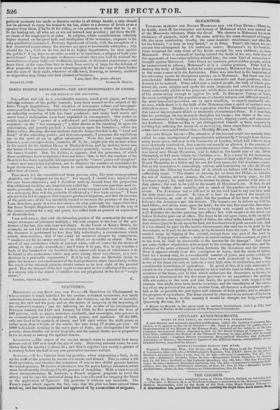ATTORNIES AND BARRISTERS,
TO THE EDITOR OF THE SPECTATOR.
DEAR Sia,—I am as much convinced as your correspondent deg:varies, of the injustice of the new regulations at the Inner Temple. I do not indeed deprecate these, or similar exclusory attempts, so much as he does. I think, as in similar instances, that the insolence of the few is preparing its own punishment. The whole'of the process by which admission to the bar is obtained, is notoriously ri- diculous, and only something like the present regulations u-as wanting to make it' detestable. I hope, and believe, that the Benchers of the loner Temple will prove- on the present occasion, as the inconsiderate friends of abuse generally '-prove,, the greatest promoters of reform. It is only by such aggravations of long- tolerated absurdity, that the public attention is at length rou,ed ; and when fairly' roused, your correspondent may rely on it, the whole will be swept away by one- general burst of rational indignation. But while I am quite alive to the mote in' the eye of the Benchers, I do not see why I should refuse to look on what may be denominated a beam in comparison. Why should not any one on whom study, or originaIpowers, or both, have conferred the required ability, be entitled ton act as an attorney, as well (as is very properly argued by Aristides) as every one- so qualified ought to be, to act as a barrister? Why should a five years' appren- ticeship and a heavy tax he levied on the candidate for an attorneyship, any more. than 4five years' mastication, and a Greek and Latin examination, on a candidate, for the bar? It is quite true, anti I am not disposed to deny its force, the obstruc- tions in the way of becoming an attorney are constituted directly by the law of the land, and *the regulations of the barristers spring from their exercise of powers. which they might have neglected without censure. But, on whomioever the: blame of the monopoly falls (for monopoly it is in both cases, and in that of the attornies a more injurious monopoly than in that of the barristers) the conse- quence to the public is the same. It is no consolation to me, who may wish to turn my modicum of talent to some profitable issue, to be told, when I wish to appear as an attorney, that there is a law which requires an apprenticeship ; or, when I wish to appear as a barrister, there is a charter which requires five years eating, and an order of the Benchers that calls for Greek, Latin, and other branches of liberal education. What I wish to be told is, why, in a free country, where • political economy has made so decisive strides in all things beside, a man should not be allowed to carry his brain g to the bar, either as a drawer of briefs or as a speaker from them, if he be fit for either, or can persuade a client that he is so. In the healing art, all who are or are not learned may practise ; yet there the life or death of the employer is at stake. In religion, where considerations infinitely higher depend on the good faith and intelligence of the instructor, sixpence is the only qualitiation demanded. To every department of trade, with the exception of a few chartered corporations, the avenues are open to honourable enterprise ; why should the law, both in its low and in its higher departments, be shut against the public ? I say then to attornies as well as to barristers, a plague of both your restrictions ! • Leave the people to discover—which they can well do without the incumbrance of your help—an inefficient, ignorant, or dishonest practitioner ; and leave them at the same time free to draw from society at large for the defence of their properties, as they now most advantageously do for the cure of their bodies and the care of their souls, whatever of efficiency, learning, or honesty, accident or disposition ntay direct into that channel of business'
I am, dear Sir, yours always



















 Previous page
Previous page